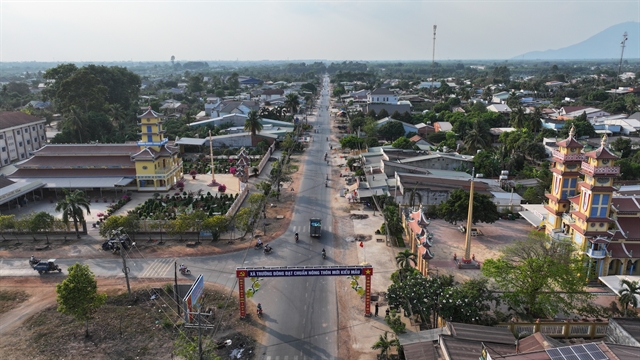 Society
Society

 |
| The appearance of Trường Đông, an exemplary new-style rural commune, in Tân Ninh Province’s Hòa Thành Town, has improved significantly. — VNA/VNS Photo Minh Phú |
TÂY NINH — Tây Ninh Province is developing new-style rural areas to improve the lives of people.
Trần Văn Chiến, deputy chairman of the provincial People’s Committee, said the province has implemented the national programme of building new-style rural areas for 12 years and it has contributed to improving socio-economic development and the lives of people in rural areas.
The environment and the appearance of rural areas are bright, green, clean, beautiful and safe, he said, adding that traditional cultural identities, social security and order in rural areas have been maintained and stabilised.
The southeast province has had 65 of its 71 communes recognised as new-style rural communes as of the end of last year.
A new-style rural commune must meet the programme’s 19 criteria related to infrastructure, irrigation, electricity, environment, income, education, healthcare, social security, culture and others.
Of the 65 new-style rural communes, 25 have been designated as advanced new-style rural communes and three as exemplary new-style rural communes.
An exemplary new-style rural commune requires higher standards than an advanced one.
The province targets to have its all 71 communes recognised as new-style rural communes and have 30 advanced new-style rural communes and four exemplary new-style rural communes next year.
Trường Đông Commune in Hòa Thành Town was recognised as an exemplary new-style rural commune last year.
It used to be an agrarian commune and after implementing the programme, it has upgraded existing roads and infrastructure for agriculture and rural development and built new ones.
It has instructed farmers to restructure their crop cultivation and apply advanced farming techniques, such as efficient irrigation, to improve production efficiency.
Võ Ngọc Khánh in Trường Đông Commune’s Trường Lưu Hamlet turned his 4,000sq.m longan orchard into a five-colour paperflower growing area in 2022 under the encouragement of local authorities.
He used advanced techniques to grow more than 2,500 paperflower trees, and this helps save water and fertiliser, he said.
Local authorities have encouraged farmers to sell produce on e-commerce platforms to improve sales, he said.
He has sold nearly 1,000 paperflower trees so far this year and earned a profit of VNĐ200 million (US$7,900), he said.
Dương Văn Ư, chairman of the Hòa Thành Town People’s Committee, said Trường Đông Commune has paved all roads to make them clean and beautiful.
Irrigation, power and water supply systems, schools and other infrastructure systems have been upgraded or newly built, he said.
Agricultural production has been developed towards commercial production, using high technology and ensuring environment protection, he said.
The national programme of “One Commune - One Product” has been implemented effectively and has improved income for rural people, he said.
Tân Nhiên Company Limited in Trường Đông Commune has its super-thin rice paper recognised as a five-star OPOC product, the highest rating, and it is exported to many markets.
Đặng Khánh Duy, general director of Tân Nhiên, said his company’s rice paper was certified as a national-level representative rural industrial product in 2023.
Huỳnh Thiện Huấn, chairman of the Trường Đông Commune People’s Committee, said Trường Đông is the only commune in the province which is selected to develop a smart new-style rural commune, and Tây Ninh is one of the country’s six provinces and cities which are selected to build smart new-style rural communes on a trial basis.
Trường Đông has chosen Trường Lưu Hamlet to develop it into a smart hamlet and has met the programme’s smart hamlet criteria.
The hamlet has cable internet covering all households and has technologycommunity groups to assist people in accessing information technology.
It has 1,145 households with 3,837 people and most of them have a livelihood related to agriculture.
Lê Văn Biểu, head of Trường Lưu Hamlet, said the hamlet’s development board advocated and encouraged farmers to restructure their crop and animal cultivation and develop many affective economic models last year.
More than 50 per cent of households in the hamlet have been trained with skills to advertise and sell their products on e-commerce platforms and social media such as Zalo and Facebook, he said.
Up to 50 per cent of adults in the hamlet have online banking accounts to pay essential services such as power and water fees, he said. — VNS




